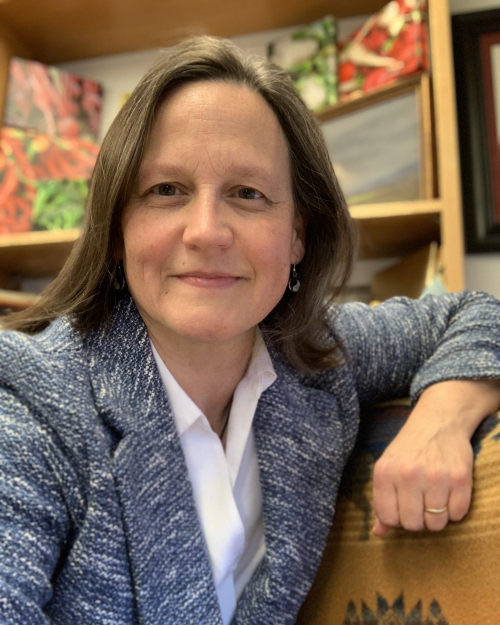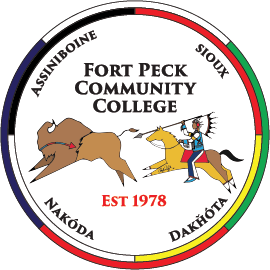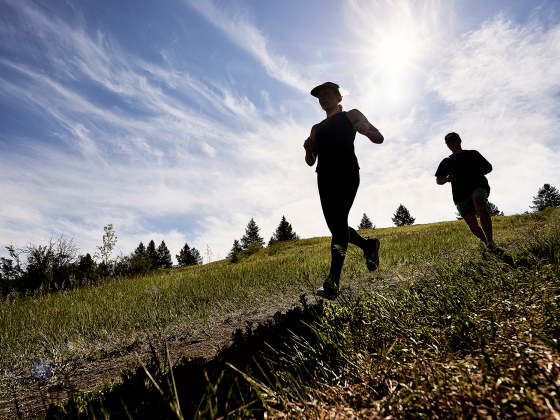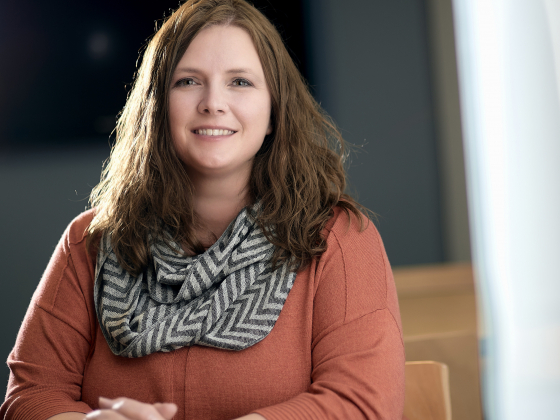Research, Creativity, and Scholarship 2021-2022

Book co-edited by Montana State University’s Bryce Hughes showcased at recent academic conference
BOZEMAN — A book co-edited by a Montana State University professor was highlighted recently at an academic conference.
“Queering STEM Culture in U.S. Higher Education: Navigating Experiences of Exclusion in the Academy,” was showcased at the American Society for Engineering Education conference held in Minneapolis at the end of June. The book was co-edited by Bryce Hughes, associate professor in the MSU Department of Education, and Stephanie Farrell from Rowan University and a past president of the American Society for Engineering Education. Its lead editor is Kelly J. Cross from the University of Nevada Reno. It was published in June by Routledge.
The book explores the experiences of members of the queer and trans communities in post-secondary science, technology, education and mathematics fields in the U.S. It includes information from students, faculty, practitioners and administrators to highlight ways members of those communities are often marginalized across a range of STEM disciplines. The book also offers recommendations for future research and practice.

BOZEMAN – Montana State University has appointed Alison Harmon, its dean of the College of Education, Health and Human Development, as its interim vice president of research and economic development.
Harmon was appointed after Jason Carter, who currently holds the position, announced he would be leaving for Baylor University in August. Harmon is expected to serve two years in the interim role with a national search for a permanent vice president slated for the fall of 2024.
“Dr. Harmon is a superb scholar with an excellent understanding of how to support and champion faculty and students in their research. I know she will shine in her new role,” said Waded Cruzado, MSU president.

Fort Peck Community College, Montana State University collaborate on documentary about buffalo
BOZEMAN — A short documentary about buffalo restoration on Montana tribal lands has been released as part of a grant collaboration between Fort Peck Community College and Montana State University.
In 2012, a small herd of buffalo from Yellowstone National Park were transferred to the Fort Peck Reservation in northeastern Montana, marking the first time genetically pure buffalo had roamed that region in over 100 years. The approximately 45-minute documentary describes how the transfer took place — from the near extinction of the buffalo to the agreements that brought them to the Fort Peck Reservation. It also highlights how Fort Peck is honoring and upholding the Buffalo Treaty, an agreement between various tribes seeking to celebrate their deep-seated relation to the buffalo and restore herds to the lands they used to roam.

New MSU study finds mental health challenges exacerbated by pandemic, declining levels of physical activity
BOZEMAN — A new study conducted by Montana State University scientists and their colleagues on the impact of COVID-19 on mental health found that physical activity is a significant factor in staving off mental health challenges.
Additionally, the study highlights the cyclical nature of the relationship between activity and mental health – if someone reported a difficult time keeping active during the pandemic, they were at higher risk of deteriorating mental health outcomes, leading to further inactivity and even further deterioration of mental health.
The paper, “Examining the Relationship Between Physical Activity and Mental Health During the COVID-19 Pandemic Across Five U.S. States,” was published in August in the journal Preventive Medicine Reports. Michelle Grocke-Dewey, assistant professor in the MSU College of Education, Health and Human Development’s Department of Health and Human Development and health and wellness specialist for MSU Extension, is the paper’s lead author.

MSU’s Hammack receives support, recognition for work focused on place-based science and engineering curriculum
BOZEMAN — When she taught engineering to middle school students in Oklahoma, Rebekah Hammack – now a faculty member in Montana State University’s College of Education, Health and Human Development – observed that many of her students at first didn’t see a connection between their lives at home and their schoolwork. But that changed with hands-on work in the classroom.
“When the students got their hands on gears and nuts and screws and bolts, they learned they knew how to problem-solve because they did it every day on the farm,” said Hammack, assistant professor in the MSU Department of Education.
“And then they realized, ‘Whoa, that’s science? That’s math?’ It completely resulted in a shift in their thoughts on school and STEM and their own beliefs in their abilities to do that kind of work,” Hammack added.

BOZEMAN — A team from Montana State University, Tufts University and the Specialty Coffee Association has published a study finding that coffee quality is sensitive to shifts in environmental factors linked to climate change as well as to shifts in climate adaptation strategies.
The paper, “Climate Change and Coffee Quality: Systematic Review on the Effects of Environmental and Management Variation on Secondary Metabolites and Sensory Attributes of Coffea arabica and Coffea canephora,” was published this month in the journal Frontiers in Plant Science.
Past research has focused on how climate change impacts crop yields, according to Selena Ahmed, associate professor in MSU’s Department of Health and Human Development in the College of Education, Health and Human Development and one of the paper’s lead authors. But recent studies have begun to look at how climate change impacts crop quality based on its biochemical composition, which influences the flavor of coffee, as well as its nutritional and health attributes.
2021-2022 EHHD Selected Publications
Selected from scholarly journal articles published between July 1, 2021 and June 30, 2022.
Department of Education
|
Title |
Journal |
Authors (*= EHHD faculty) |
|
Choosing a rural teaching position: The importance of relationships and field experiences |
Australian and International Journal of Rural Education, 32(3):38-52 |
Versland, T* Wilson, S* Downey, J* |
|
Considering Indigenous Research Methodologies: Bicultural Accountability and the Protection of Community Held Knowledge |
Qualitative Inquiry, 28(2)151-163 |
Windchief, S* Cummins, JD*
|
|
Digital Rural Community Walks: Building Preservice Teachers’ Rural Engagement through Technology Integration |
Journal of Technology and Teacher Education, 30(2)135-143 |
Lux, N* Downey, J* Luebeck, J Hicks, J* |
|
Fifth Grade Chinese and U.S. Students' Division Problem Posing: A Small-Scale Study |
Hiroshima Journal of Mathematics Education, 15 (Special Issue):85-97 |
Luo, F* Yu, Y (graduate student) Meyerink, M (graduate student) Burgal, C (graduate student)
|
|
Poverty and Middle Level Achievement in a Common Core State: What Are We Missing? |
Middle Grades Review |
Dotson, L*
|
Department of Health & Human Development
|
Title |
Journal |
Authors (*= EHHD faculty) |
|
#Alonetogether: An exploratory study of social media use at the beginning of the COVID-19 pandemic |
The Journal of Social Media in Society, 11(1):27-45 |
Vaterlaus, JM* Patten, EV Spruance, L
|
|
“Press on, continue on”: Rural parents’ experiences of transitions within early intervention. |
Rural Special Education Quarterly, 41(4):197-210 |
Decker, KB* Feigel, AJ (graduate student) Foster, TD Kepl, RL (undergraduate student)
|
|
An ecological approach to understanding women’s reproductive health and pregnancy decision making in Greenland |
Health & Place, 77 |
Rink, EL* Peterson, M (graduate student)
|
|
Social-ecological and biographical perspectives of principals’ involvement in comprehensive school physical activity programs: A person-centered analysis |
Physical Education and Sport Pedagogy |
Orendorff, KL* Webster, C Mindrila, D Cunningham, KMW Doutis, P Dauenhauer, B Stodden, DF |
|
Developing culturally acceptable peanut nutrition bars with smallholder women farmers in Kaffrine, Senegal using response surface methodology |
Journal of Food Science |
Allan, E (graduate student) Ndiaye, A Raber, E (undergraduate student) Song, M Kuo, WY* |
